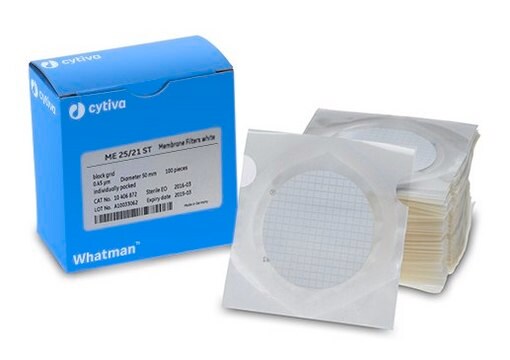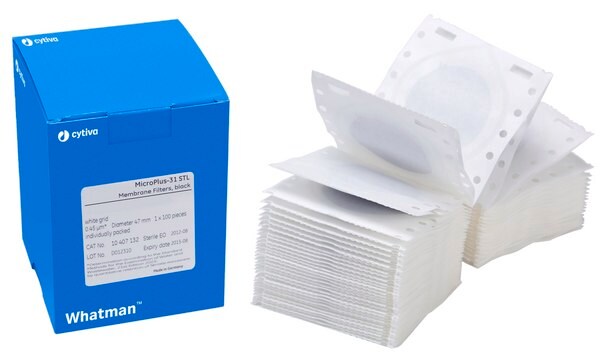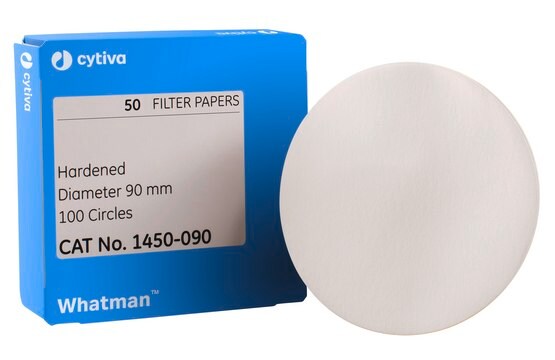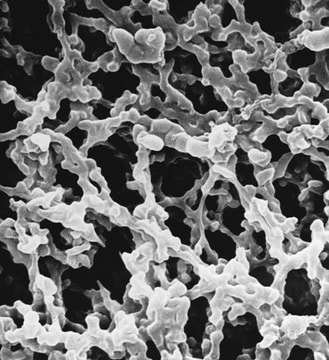WHA10407170
Whatman® celluose nitrate MicroPlus-21 STL filter discs 0.45 μm pore size
green, hydrophilic, black grid (3.1 mm), sterile, for membrane butler, 400 ea, 47 mm diam
Synonym(s):
Whatman filter, Z697656, filter Whatman
About This Item
Recommended Products
Product Name
Whatman® MicroPlus STL membranes for microbiological control, MicroPlus-41 STL membrane circles green, for Membrane-Butler, cellulose nitrate, diam. 47 mm, pore size 0.45 μm, black grid, sterile, pkg of 400 ea
material
black grid
cellulose nitrate
sterility
sterile
packaging
pkg of 400 ea
manufacturer/tradename
Whatman 10407170
Whatman Article No. 28415191 (US reference)
diam.
47 mm
pore size
0.45 μm
Looking for similar products? Visit Product Comparison Guide
General description
In these products the microorganism counts are very low and are therefore determined quantitatively via enrichment methods. Production processes are monitored continuously at their critical points (tanks, pipelines, filling units) as are the finished products. The membrane filtration method is the optimal analytical method for doing this.
Method:
The liquid is filtered through a membrane. The microorganisms collect on the membrane surface. The filter is incubated on a nutrient medium and the individual colonies can then be evaluated. The method is also suitable for large sample volumes and low microorganism counts.
Reliability:
The quality control and product design of our membrane filters are strictly controlled and offer users significant advantages.
Test parameters:
All membranes used for microbiological quality control are tested systematically in order to ensure the same high quality from batch to batch. Parameters tested are bubble point, flow rate, bacterial retention, recovery rate, and sterility.
Type STL in dispenser boxes with 100 numbered membrane filters for easy removal and safe handling, for use with most commercially available membrane dispensers including the Membrane-Butler (supplied in 4 boxes each with 100 membrane filters) ME Membranes.
Features and Benefits:
- Special membrane filters made from cellulose nitrate developed for microbiological quality control
- High mechanical strength
- High flow rate
- Sterile, individually packed
- All membrane filters have a high-contrast grid (3.1 mm)
Features and Benefits
- All MicroPlus-21 membrane filters are white with a high-contrast black grid (3.1 mm)
- Designed specifically for microbiological QC
- High mechanical strength and flow rate
- Tested for bubble point, bacterial retention, flow rate, recovery rate, and sterility
- Individually packaged for convenience and sterility
- Type STL provided in dispenser boxes with 100 numbered membrane filters for easy removal and secure handling using Cytiva′s Membrane-Butler
Other Notes
Legal Information
Sold under license to DE10102744 and foreign equivalents thereof
Choose from one of the most recent versions:
Certificates of Analysis (COA)
Sorry, we don't have COAs for this product available online at this time.
If you need assistance, please contact Customer Support.
Already Own This Product?
Find documentation for the products that you have recently purchased in the Document Library.
Our team of scientists has experience in all areas of research including Life Science, Material Science, Chemical Synthesis, Chromatography, Analytical and many others.
Contact Technical Service




